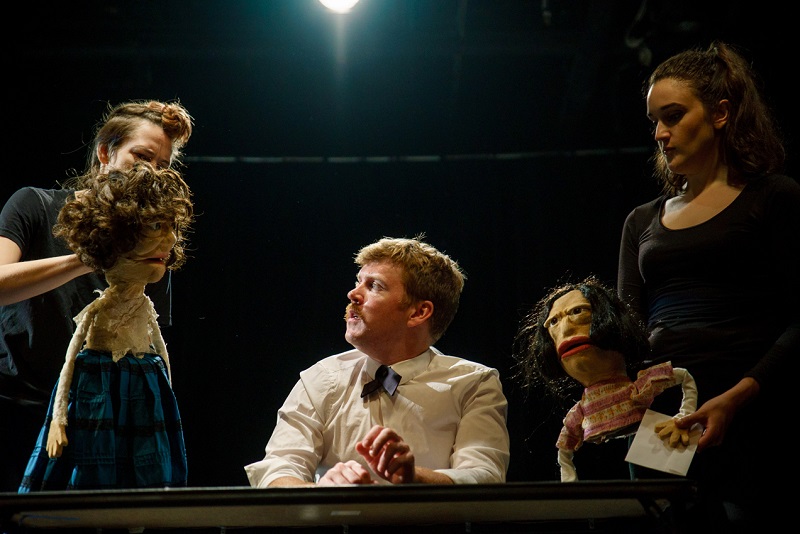
The same day that we saw Friends Call Me Albert, Zachary Desmond's world premiere "bio-epic" of Albert Einstein, Gizmodo headlined a post about a new paper arguing that quantum entanglement is an inevitable feature of any fundamental physical theory, "Scientists Finally Prove Strange Quantum Physics Idea Einstein Hated." While the Gizmodo piece itself describes entanglement as "what allows particles that have once interacted to share a connection regardless of the separation between them," it also quotes Einstein's derisive description of it as "'spooky action at a distance.'" A century after his general theory of relativity was published and more than half a century after his death, Einstein remains, at least in the popular imagination, the central point of reference for modern physics. Desmond's play too takes this towering figure as its center, but it also illuminates an important woman historically obscured by the tower's shadow.
The production begins in 1919, at the point when Einstein's theory of relativity, published four years previously, was receiving widespread acclaim having been tested by an eclipse; Albert (Steven Conroy) ends up buried in food, friends, family, and admirers onstage. It doesn't take too long, however, for it to become clear that this is not a linear biographical narrative; and, within the postmodern bricolage of the play's structure, the core organizing principle becomes clear when Albert meets Mileva Marić (Julie Congress), another student of physics who will become his first wife. Over the course of the play, we see their courtship, a lot of drinking and debate with their circle of friends, an ill-fated meeting with Albert's bourgeois parents, an unexpected pregnancy (in one of the production's instances of creative lighting and staging), and its aftermath. Their relationship provides the gravitational force that holds together the collage of memories and impressions from Einstein's life that we witness, reflective of and reflected in, perhaps, his occasional feeling that his "life is just this series of moments, mashed together, with all the stuff in the middle cut out."
The relative experience of time in Einstein's theories is paralleled by how Friends Call Me Albert structures the experience of its audience and characters. The recurring metaphor of the eclipse highlights the influence of perspective, which bends events like gravity bends light. All of the characters aside from Albert and Mileva are played by puppets, operated by Chris Clark, Alison Novelli, and Emily Vetsch, which not only allows a small cast to embody a large number of people but also suggest that from Albert's dominant perspective, he and Mileva are the only "real" people in the story. (His second wife, Elsa, in contrast, appears only as a puppet, albeit one larger than the others.) Friends represents Mileva as having a substantial role in Einstein's achievements, certainly in their writing and dissemination, and, near the end, she offers a counterbalancing perspective to Albert's during an affecting, time-bending postmortem of their relationship and her own scientific ambitions.
No .11 Productions is a group of eleven (you guessed it!) multidisciplinary artists, and, under the direction of Ryan Emmons, their collaborative process brings a number of inventive elements to the production. These range from the aforementioned pregnancy scene; to the physical representations of light -- strikingly beautiful and important in the play as a metaphor and as Albert's obsession -- both by the puppeteers and by floor-to-ceiling strings that suggest beams of light or lines of force; to musician Enrico de Trizio's onstage work, worth watching in itself; to Albert and Mileva transforming themselves and their lives into equations scrawled in chalk on the theater walls. Steven Conroy's Albert is primarily personable and enthusiastic, with flashes of stubbornness and inability to cope, and Julie Congress showcases a complex Mileva who is tender and supportive as much as assertive and driven. Together, they establish a multidimensional relationship, with its physical and intellectual chemistry as well as its tensions and disappointments, that lends the necessary emotional weight to their climactic conversation.
The tone is overwhelmingly modern and amusing -- the puppets tend to bring a lot of levity to their scenes and get many of the best jokes -- but the second half of the play injects a heavier dose of melancholy, even as linearity collapses more aggressively and completely and the unkempt white-haired Einstein wig makes its first appearance. We have seen Albert's self-doubt at times by this point, but the second act finds him past his scientific zenith, never finding the unifying theory of physics that he sought and facing the ethical dilemma, juxtaposed with his and Mileva's family and marriage troubles 20 years previously, of being asked to help persuade President Roosevelt to develop an atomic bomb. For all the talk of immutable forces, and predetermined paths, ultimately, the play highlights the significance of choice, and it chooses to give the last words of the evening to Mileva. It's up to you to make the choice to hear them yourself. - Leah Richards and John Ziegler
